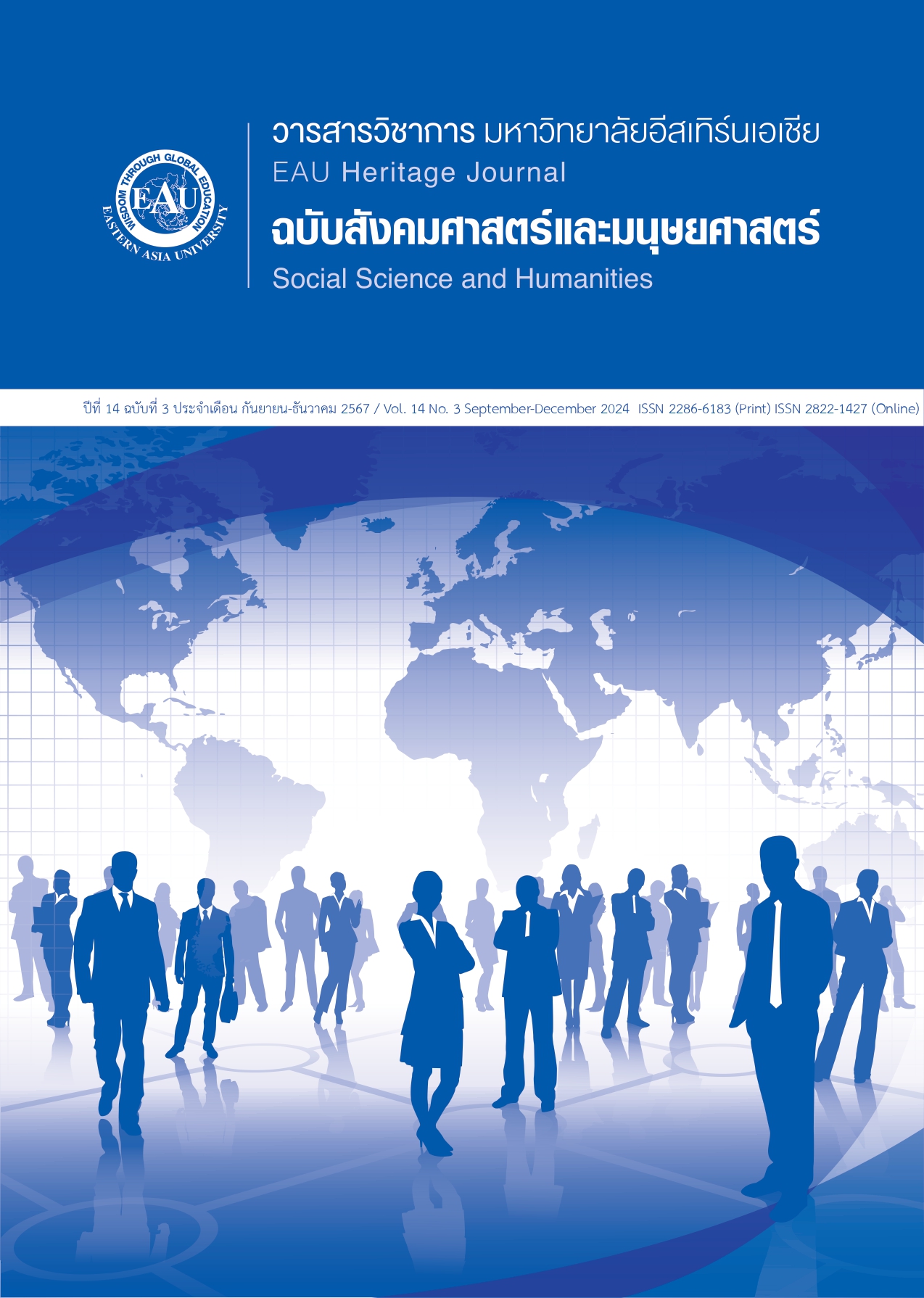Factors Affecting the Growth Mindset of Students: Meta-Analytic Structural Equation Modeling
Keywords:
Factors Affecting, Growth Mindset of Students, Meta-Analytic Structural Equation ModelingAbstract
The objectives of this study were 1) to synthetize the effect size of Factors affecting the Growth Mindset of students, and 2) to develop a structural equation model of student Growth Mindset. The data was collected in which 255 articles written in English between 2022 and 2023 were selected; however, only 9 articles were feasible for the meta-analysis. MASEM was employed for the data analysis using R program. The results of the study were as follows: 1) the effect sizes of factors affecting the Growth Mindset of students was equal to 0.33, with a 95% confidence interval ranging from 0.11 to 0.57, and 2) the model was fitted to the empirical data considered from the chi-square value. (χ2 (1, N=16,583) =2.67, p=.10, CFI=1.00, RMR=.00, RMSEA=.01)
References
Affuso, G., Zannone, A., Esposito, C., Pannone, M., Miranda, M. C., De Angelis, G., &
Bacchini, D. (2023). The effects of teacher support, parental monitoring, motivation and self-efficacy on academic performance over time. European journal of psychology of education, 38(1), 1-23.
Cheung, M. W. L. (2009). Meta–analysis: A structural equation modeling perspective. paper presented at the association for psychological science 21st annual convention, San Francisco, CA, USA.
Cheung, M. W. L., & Chan, W. (2005). Meta-analytic structural equation modeling: A two-stage approach. Psychological methods, 10(1), 40.
Del Re, A. C. (2015). A practical tutorial on conducting meta-analysis in r. The quantitative methods for psychology, 11(1), 37-50. Doi: http://doi.org/10.20982/tqmp.11.1p037
Du, W., Li, Z., Xu, Y., & Chen, C. (2023). The effect of parental autonomy support on grit:
The mediating role of basic psychological needs and the moderating role of achievement motivation. Psychology research and behavior management, 939-948.
Dweck, C. S. (2006). Mindset: The new psychology of success. New York: Random
House.
Feldman, B. C. (2017). The grit guide for teens: A workbook to help you build perseverance,
self-control, and a Growth Mindset. New Harbinger Publications.
Guo, W., Bai, B., Zang, F., Wang, T., & Song, H. (2023). Influences of motivation and
grit on students’ self-regulated learning and English learning achievement: A comparison between male and female students. System, 114, 103018.
Hadipoor, M., Jomehri, F., & Ahadi, H. (2015). The effect of training program based on theory
of mindset about intelligence on learning behaviors of preschoolers (4-6 Years): A
threestage experiment. International journal of review in life sciences, 5(8), 1047-
Kaitbanditkul, N. (2022). The relationship between mindset and self-efficacy in cadets. NKRAFA
journal of humanities and social sciences, 10, 20-32.
Lee, Y. (2023). A cross-national Study of mathematics achievement via three-level
multilevel models. Doctoral dissertation, Virginia Tech.
Li, K., Zhang, J., Wu, Z., & Zheng, Y. (2023). Intelligence mindset in Chinese children: The
role of parental praise and autonomy support. Journal of applied developmental psychology, 87, 101555.
Llorca, A., Cristina, R. M., & Malonda, E. (2017). Parenting, peer relationships, academic
self-efficacy, and academic achievement: Direct and mediating effects. Frontiers in psychology, 8, 316809.
Lou, N. M., & Li, L. M. W. (2023). The mindsets× societal norm effect across 78 cultures:
Growth mindsets are linked to performance weakly and well‐being negatively in societies with fixed‐mindset norms. British journal of educational psychology, 93(1), 134-152.
Marks, R. A., Norton, R. T., Mesite, L., Fox, A. B., & Christodoulou, J. A. (2023). Risk and
resilience correlates of reading among adolescents with language-based learning disabilities during COVID-19. Reading and writing, 36(2), 401-428.
Patphol, M. (2018). Learning documents for the course: Seminar on innovative coaching
for cognition. Retrieved from http://www.curriculumandlearning.com
Pyo, D. (2023). The mediating effect of growth mindset in the relationship between
dolescents’ optimism and grit. Current psychology, 43(4).
Rahnama, H. H., Saeedikiya, M., & Seif, M. H. (2023). The psychology of green
behavior: When growth mindset, peer influence and warm glow meet the individual self. Management of environmental quality: An international journal. Doi: 10.1108/MEQ-09-2022-0268
Rungrueng, C., & Chadcham, S. (2016). Growth mindset: New approach of human potential
development. Research methodology & cognitive science, 14(1), 1-13.
Rusadi, R. M., Sugara, G. S., & Isti’adah, F. N. (2023). Effect of mindfulness-based
cognitive therapy on academic grit among university student. Current psychology, 42(6), 4620-4629.
Sadoughi, M., & Hejazi, S. Y. (2023). Teacher support, growth language mindset, and
academic engagement: The mediating role of L2 grit. Studies in educational evaluation, 77, 101251.
Tangutairuang, T. (2016). Meta-analytic structural equation modeling. Suratthani
rajabhat journal, 3(2), 57-80.
The Institute for the Promotion of Teaching Science and Technology. (2022). Having a
growth mindset among Thai Students results from the assessment PISA 2018.
Retrieved from https://drive.google.com/file/d/1PNplF9_rH509QSCWokDcBi-
yIdvNqRFA/view
Yalcin, S. B., & Yilmaz, E. (2023). A Study on the predictability of Students’ grit by their
growth mindset. Participatory educational research, 10(5), 184-199.





